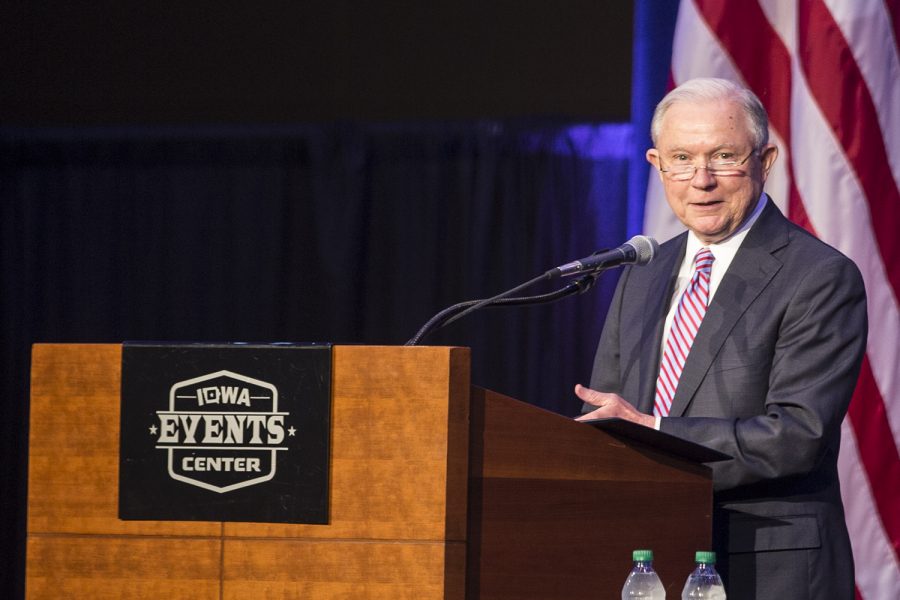In Des Moines judicial conference, transparency in battle to confirm Brett Kavanaugh comes to forefront
U.S. Attorney General Jeff Sessions at Des Moines judicial conference: President Trump ‘has nominated faithful, restrained judges.’
U.S. Attorney General Jeff Sessions spoke at the Eighth Circuit Judicial Conference at the Iowa Events Center in Des Moines Friday, August 17, 2018. Sessions spoke to a group of judges supporting President Trump’s U.S. Supreme Court nomination, Brett Kavanaugh.
August 17, 2018
DES MOINES — Judge Brett Kavanaugh may become the next Supreme Court justice in the near future, said U.S. Attorney General Jeff Sessions during a Aug. 17 address to attendees of the 8th Circuit Judicial Conference.
President Trump nominated Kavanaugh, a judge for the D.C. Circuit Court of Appeals, on July 9 to fill the vacant seat left by retiring U.S. Supreme Court Associate Justice Anthony Kennedy.
Senate Judiciary Committee hearings will begin Sept. 4, said Senate Judiciary Committee Chairman Chuck Grassley, R-Iowa. The period between the nomination and the start of hearings will be longer than that for the last three justices the Senate has confirmed: Neil Gorsuch, Elena Kagan, and Sonia Sotomayor.
“Judge Kavanaugh’s testimony will only add to the enormous wealth of information about his legal qualifications, his professional reputation, and his jurisprudence that is already available,” Senate Majority Leader Mitch McConnell, R-Ky., said in a statement on Aug. 16.
Grassley said on Aug. 17 that the confirmation process will last the whole week at the very least, adding it will take as long as his colleagues need.
“In the case of Gorsuch, I cut off [senators] from asking their questions, and I don’t intend to do that in this particular instance unless I see a stall,” Grassley told reporters.
Sessions and Grassley noted Kavanaugh’s nomination has produced more than 200,000 documents from his previous positions to be examined. Grassley said there will be roughly 1 million in total, and the Judiciary Committee will finish looking through them by Aug. 31.
“I think those records and his hearing will confirm what his reputation already tells us: that Judge Kavanaugh will be a truly great Supreme Court justice,” Sessions said.
Democrats, including Sen. Dianne Feinstein, D-Calif., the ranking member of the Judiciary Committee, have called for more transparency in the confirmation process through the publication of documents. In the statement, she referenced the nomination of Justice Elena Kagan, in which 99 percent of her White House record was provided to the committee and public before her confirmation hearing.
“The longstanding practice of this committee and the Senate is to ensure as much transparency as possible and to ensure that the Senate and the American people have access to a nominee’s full record,” Feinstein said in an Aug. 16 statement.
Grassley said many of the documents submitted to the committee are available to the public, but some are committee-confidential, and most of them will be made public eventually.
The White House has characterized the judicial-nomination process as having a historic degree of transparency.
In November 2017, Trump published a list of 25 potential candidates — vetted by the Federalist Society for Law and Public Policy Studies, an organization for conservatives and libertarians interested in changing the legal system — to fill any vacant Supreme Court seats. The list included two Iowans: Iowa Supreme Court Justice Edward Mansfield and U.S. Court of Appeals for the 8th Circuit Judge Steven Colloton, an Iowa City native.
The Supreme Court nomination is part of the latest round of judicial appointments from Trump. On Aug. 16, the Senate confirmed two more of Trump’s nominees — U.S. District Judge Marvin Quattlebaum and U.S. Attorney’s Office Deputy Chief Jay Richardson — to fill seats on the 4th Circuit Court of Appeals. That same day, Trump announced the 17th wave of U.S. attorney nominations with four candidates for districts in California, Florida, Illinois, and North Dakota.
“He told the American people that he wanted judges who would respect text, history, and the role of the coequal branches,” Sessions said. “President Trump has kept his promise; he has nominated faithful, restrained judges.”



